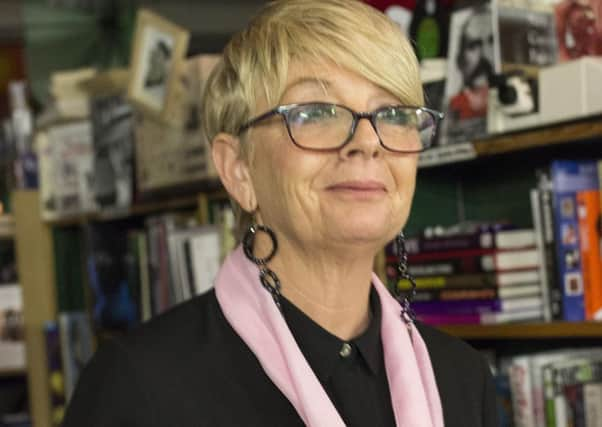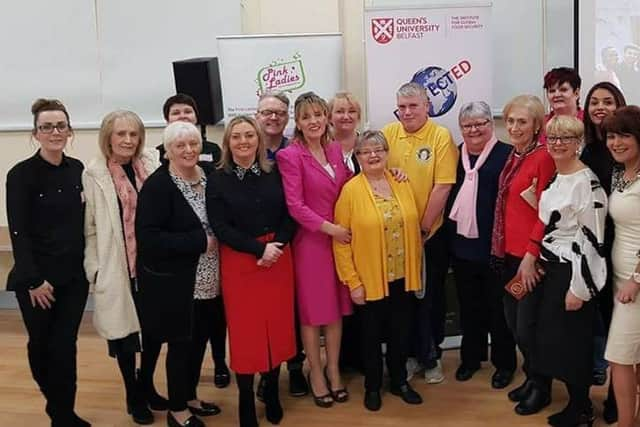Taking action for your own health and well-being


The co-chairperson of Derry’s Pink Ladies/ Pink Panthers Cancer Support Group has urged people to take a closer look at the food and products they use every day to help safeguard themselves from cancer and other adverse health conditions.
Jacquie Loughrey was speaking as the Pink Ladies/ Pink Panthers hosted a major event focusing on cancer prevention and risk reduction in the Bishop Street Community Centre to mark World Cancer Day 2018.
Advertisement
Hide AdAdvertisement
Hide AdDuring the day, cancer thrivers, local politicians and representatives from statutory bodies, cancer focus groups and public health bodies heard from a variety of speakers including guest speaker Dr Lisa Connolly, Reader in Toxin Food Safety at the School of Biological Science at Queen’s University, Belfast.


Jacquie Loughrey meanwhile spoke on ‘Learn More, Use Less; Reduce Your Risk to Everyday Chemicals’, while Margaret Cunningham, Facilitator with the Pink Panthers, spoke on the importance of ‘Diet, Nutrition and Exercise: A Guide to a Healthier Lifestyle’.
Jacquie said that the Pink Ladies/Pink Panthers over the coming years will be lobbying and campaigning for chemical exposure to be included in discussions around primary cancer prevention focus.
Jacquie, who is a breast cancer thriver, has been conducting her own research for two years and said there were steps people could take on their own initiative to help reduce the risk of cancer by reassessing the items they use every day, in line with the current World Cancer Day theme of ‘We Can, I Can’.
Advertisement
Hide AdAdvertisement
Hide Ad“Basically what this is referring to is that we can work as a partnership to combat cancer; and ‘I can take accountability and responsibility for my health and well being as well to prevent myself from getting cancer.’


“As a cancer thriver, I have changed my diet, looked at chemicals I am putting into my body every day. I changed to an organic-lifestyle, eating grass-fed meat and unfarmed fish to avoid having any pesticides in my food. Not a lot of people would do as much as that and they don’t have to. If they can reduce the risk in some way then that is positive.
“The problem is there are a handful of chemicals that are called endocrine disrupting chemicals (EDCs) and these chemicals are known to disrupt hormones. They are regulated by the EU to some degree, but the worry now is we are creating a cocktail mixture on our body, so whilst a company would say they are within the regulations for a certain chemical and they are, they don’t take into consideration that we are using multiple chemicals on our body, we are sitting on sofas that contain flame retardants for instance. There has been no research done on how these chemicals mix together and that is the real danger.”
In practical terms, Jacquie said, people could look at chemicals in items such as shampoos, skincare products, cosmetics and food packaging.
Advertisement
Hide AdAdvertisement
Hide Ad“BPA [bisphenol A] is a particularly insidious chemical,” she said. “It’s everywhere. It’s in plastic bottles, tin cans and it’s in till receipts and food packaging. BPA has been acknowledged by the EU as a hormone-disrupting chemical and they have spent several years reducing the dosage, regulating the amount that can be used in products, but endocrinologists and scientists would say there is no safe dose for BPA and they would be very much looking for it to be banned completely.
“I try to eat organic fruit and vegetables where possible as they may contain fewer chemicals. It tastes better because of different production methods and so may contain more nutrients. Get into a habit of washing thoroughly before using as a further precaution.
Jacquie said that increasingly there affordable alternatives appearing on supermarket shelves as more and more companies take heed of growing demand for organic and chemical free products.
“In the same way that the zero waste and the plastics issue has now come to a head, I feel that there is a small revolution happening and people are becoming more aware and more educated due to the internet, and they are demanding more.
Advertisement
Hide AdAdvertisement
Hide Ad“I’m already seeing zero per cent aluminium deodorant on supermarket shelves,” she said, while urging people to explore ethical brands that are EcoCert Organic or Natural Cosmetic, Soil Association Organic branded which means at least 95 per cent organic ingredients.
Offering further advice to local people, Jacquie said: “Learn to read ingredients- the less ingredients listed, the healthier it is in terms of exposure. Use stainless steel or glass for your drinking water and avoid tinned foods, choose glass jars or cardboard packages, tetrapacks. You can make your own household cleaner as well using bicarbonate of soda, white wine vinegar and lemon. Make up your own products - I have been making up my own creams. That way you can see exactly what you are putting into it.
“My message is ‘Learn More, Use Less.’ The more you learn about these damaging chemicals the less you are going to use them. And there are affordable alternatives. Some companies are starting to take heed of the consumers.”
Scientific research conducted by the European Union among others has demonstrated links between individual chemicals and the development of cancer among other health conditions.
Advertisement
Hide AdAdvertisement
Hide AdJacquie said: “The people who are most at risk are pregnant women, breast feeding mothers and cancer thrivers like myself because one of the things EDCs do is mimic oestrogen. I had an oestrogen-fed tumour so I do not need to put myself at risk from a chemical that is going to mimic more oestrogen in my body.”
One of the key campaign messages from the PLCSG is that more funding needs to be allocated towards cancer prevention. Jacquie said: “The National Cancer budget in the UK totals £580m and that includes all the charity contributions. Of that £580m, 5.4 per cent will be used for research on prevention which is a total of £31m.”
She added that what was even more staggering was that a study has estimated that EU countries were spending €150bn per year to treat the health impacts of EDCs.